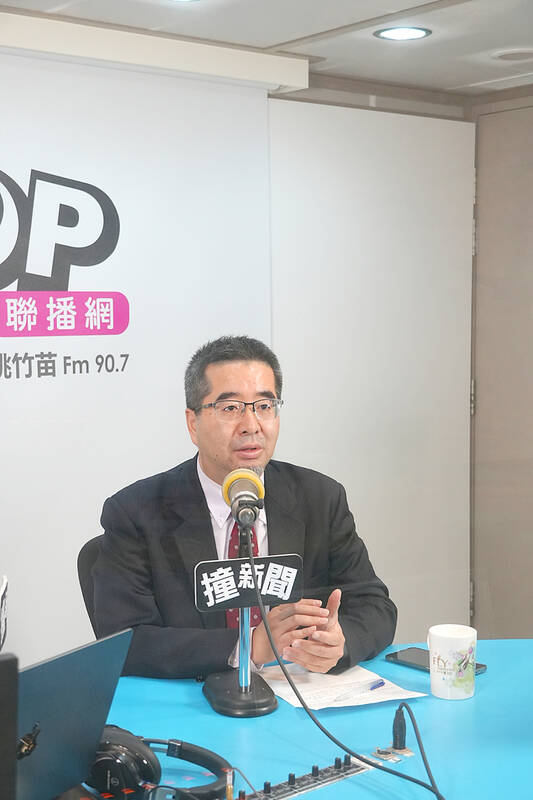An aide to former president Ma Ying-jeou (馬英九) yesterday teased the possibility of Ma meeting with Chinese President Xi Jinping (習近平) during his upcoming trip to China.
Ma is just “a regular citizen,” as he left the presidency eight years ago and does not hold any position in government or politics, Ma Ying-jeou Culture and Education Foundation director Hsiao Hsu-tsen (蕭旭岑) said in a radio interview.
However, based on the important history that Ma and Xi made when they met in 2015, the former president “of course hopes there is an opportunity to see an old friend,” Hsiao said.

Photo courtesy of Pop Radio News
Pressed on whether arrangements were being made for such a meeting, Hsiao said only that he “hoped” it would take place.
However, because the delegation would be guests, the exact arrangements are being left up to the Chinese side, he said.
Ma, who was president from 2008 to 2016, held a historic meeting with Xi in Singapore in 2015, marking the first meeting of leaders from the two sides of the Taiwan Strait since the end of the Chinese Civil War in 1949.
Ma also became the first former Taiwanese president to visit China in spring last year, and on Monday, his foundation announced that he is planning to lead another delegation of students to the country from Monday next week to April 11.
The delegation is to tour companies, visit sites of Chinese historical and cultural significance, and hold exchanges with university students in Beijing and Guangdong and Shaanxi provinces, the foundation said.
That this trip, unlike Ma’s previous one, is to include a stop in Beijing has given rise to speculation that a second Ma-Xi meeting could be in the works.
Premier Chen Chien-jen (陳建仁) said that he “respects” the former president’s right to visit China as a private citizen, but nevertheless hopes that Ma would act in a way that meets the expectations of the Taiwanese public on matters relating to sovereignty, democracy and the rule of law.
Taiwan People’s Party Chairman Ko Wen-je (柯文哲) told reporters he was not opposed to Ma’s visit, as long as it was conducted on the basis of “dignity and parity.”

CHANGING LANDSCAPE: Many of the part-time programs for educators were no longer needed, as many teachers obtain a graduate degree before joining the workforce, experts said Taiwanese universities this year canceled 86 programs, Ministry of Education data showed, with educators attributing the closures to the nation’s low birthrate as well as shifting trends. Fifty-three of the shuttered programs were part-time postgraduate degree programs, about 62 percent of the total, the most in the past five years, the data showed. National Taiwan Normal University (NTNU) discontinued the most part-time master’s programs, at 16: chemistry, life science, earth science, physics, fine arts, music, special education, health promotion and health education, educational psychology and counseling, education, design, Chinese as a second language, library and information sciences, mechatronics engineering, history, physical education

The Chinese military has boosted its capability to fight at a high tempo using the element of surprise and new technology, the Ministry of National Defense said in the Quadrennial Defense Review (QDR) published on Monday last week. The ministry highlighted Chinese People’s Liberation Army (PLA) developments showing significant changes in Beijing’s strategy for war on Taiwan. The PLA has made significant headway in building capabilities for all-weather, multi-domain intelligence, surveillance, operational control and a joint air-sea blockade against Taiwan’s lines of communication, it said. The PLA has also improved its capabilities in direct amphibious assault operations aimed at seizing strategically important beaches,

‘MALIGN PURPOSE’: Governments around the world conduct espionage operations, but China’s is different, as its ultimate goal is annexation, a think tank head said Taiwan is facing a growing existential threat from its own people spying for China, experts said, as the government seeks to toughen measures to stop Beijing’s infiltration efforts and deter Taiwanese turncoats. While Beijing and Taipei have been spying on each other for years, experts said that espionage posed a bigger threat to Taiwan due to the risk of a Chinese attack. Taiwan’s intelligence agency said China used “diverse channels and tactics” to infiltrate the nation’s military, government agencies and pro-China organizations. The main targets were retired and active members of the military, persuaded by money, blackmail or pro-China ideology to steal

DEADLOCK: As the commission is unable to forum a quorum to review license renewal applications, the channel operators are not at fault and can air past their license date The National Communications Commission (NCC) yesterday said that the Public Television Service (PTS) and 36 other television and radio broadcasters could continue airing, despite the commission’s inability to meet a quorum to review their license renewal applications. The licenses of PTS and the other channels are set to expire between this month and June. The National Communications Commission Organization Act (國家通訊傳播委員會組織法) stipulates that the commission must meet the mandated quorum of four to hold a valid meeting. The seven-member commission currently has only three commissioners. “We have informed the channel operators of the progress we have made in reviewing their license renewal applications, and